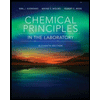A bimolecular chemical reaction is one in which two chemicals react to form another substance. Suppose that one molecule of each of the two chemicals reacts to form two molecules of a new substance. If x represents the number of molecules of the new substance at time t, then the rate of change of x is proportional to the square of the numbers of molecules of the original chemicals available to be converted. That is, if each of the chemicals initially contained A molecules, then dx - = k(A – x)2 dt where k is a constant. If 10% of the initial amount A is converted after 1 hour, how long will it be before 80% is converted? (Give an exact answer. Do not round.) hr
A bimolecular chemical reaction is one in which two chemicals react to form another substance. Suppose that one molecule of each of the two chemicals reacts to form two molecules of a new substance. If x represents the number of molecules of the new substance at time t, then the rate of change of x is proportional to the square of the numbers of molecules of the original chemicals available to be converted. That is, if each of the chemicals initially contained A molecules, then dx - = k(A – x)2 dt where k is a constant. If 10% of the initial amount A is converted after 1 hour, how long will it be before 80% is converted? (Give an exact answer. Do not round.) hr
Chemistry for Engineering Students
4th Edition
ISBN:9781337398909
Author:Lawrence S. Brown, Tom Holme
Publisher:Lawrence S. Brown, Tom Holme
Chapter11: Chemical Kinetics
Section: Chapter Questions
Problem 11.36PAE: The reaction NO(g) + O,(g) — NO,(g) + 0(g) plays a role in the formation of nitrogen dioxide in...
Related questions
Question

Transcribed Image Text:A bimolecular chemical reaction is one in which two chemicals react to form another substance. Suppose that one molecule of each of the two chemicals reacts to form two molecules of a new substance. If x represents the
number of molecules of the new substance at time t, then the rate of change of x is proportional to the square of the numbers of molecules of the original chemicals available to be converted. That is, if each of the
chemicals initially contained A molecules, then
dx
- = k(A – x)2
dt
where k is a constant. If 10% of the initial amount A is converted after 1 hour, how long will it be before 80% is converted? (Give an exact answer. Do not round.)
hr
Expert Solution
This question has been solved!
Explore an expertly crafted, step-by-step solution for a thorough understanding of key concepts.
This is a popular solution!
Trending now
This is a popular solution!
Step by step
Solved in 3 steps with 4 images

Knowledge Booster
Learn more about
Need a deep-dive on the concept behind this application? Look no further. Learn more about this topic, chemistry and related others by exploring similar questions and additional content below.Recommended textbooks for you

Chemistry for Engineering Students
Chemistry
ISBN:
9781337398909
Author:
Lawrence S. Brown, Tom Holme
Publisher:
Cengage Learning

Chemical Principles in the Laboratory
Chemistry
ISBN:
9781305264434
Author:
Emil Slowinski, Wayne C. Wolsey, Robert Rossi
Publisher:
Brooks Cole

Chemistry: The Molecular Science
Chemistry
ISBN:
9781285199047
Author:
John W. Moore, Conrad L. Stanitski
Publisher:
Cengage Learning

Chemistry for Engineering Students
Chemistry
ISBN:
9781337398909
Author:
Lawrence S. Brown, Tom Holme
Publisher:
Cengage Learning

Chemical Principles in the Laboratory
Chemistry
ISBN:
9781305264434
Author:
Emil Slowinski, Wayne C. Wolsey, Robert Rossi
Publisher:
Brooks Cole

Chemistry: The Molecular Science
Chemistry
ISBN:
9781285199047
Author:
John W. Moore, Conrad L. Stanitski
Publisher:
Cengage Learning

Chemistry by OpenStax (2015-05-04)
Chemistry
ISBN:
9781938168390
Author:
Klaus Theopold, Richard H Langley, Paul Flowers, William R. Robinson, Mark Blaser
Publisher:
OpenStax

Introductory Chemistry: An Active Learning Approa…
Chemistry
ISBN:
9781305079250
Author:
Mark S. Cracolice, Ed Peters
Publisher:
Cengage Learning

Chemistry
Chemistry
ISBN:
9781305957404
Author:
Steven S. Zumdahl, Susan A. Zumdahl, Donald J. DeCoste
Publisher:
Cengage Learning